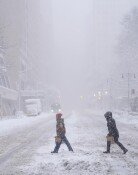[Editorial] Keep Economic Focus
[Editorial] Keep Economic Focus
Posted October. 13, 2006 06:52,
The government announced yesterday that it will manage the macroeconomy in a stable manner in consideration of the shock from North Koreas nuclear test. It did not propose any concrete measures saying it will watch the developments surrounding the nuclear test before including any countermeasures in the economy management plan for the next year to be released at the end of this year. However, the government is being too complacent only to ask the public to stay calm citing no sign of a fall in FDI in Korea and panic buying or hoarding of daily necessities.
Bank of Korea Governor Lee Sung-tae predicted that North Koreas nuclear test will add pressure to the South Korean economy. Vice Minister of Finance and Economy Park Byung-won was also concerned about the possibility of some short-term impact materializing. Nevertheless, Finance Minister Kwon O-kyu just added confusion to the market by postponing plans to introduce pump-priming measures to the end of the year after signaling immediate boosting of the economy at the National Assembly the previous day referring to the need to expand the economy.
The governments projection of the next years growth rate at 4.6 percent had been received with skepticism from the market even before North Koreas provocation. Some private research institutes have implied that it will be difficult to achieve even 4.0 percent growth, illustrating the publics distrust of the government that fails to devise measures to revive investment and consumption. In addition, companies are not very enthusiastic about the business environment improvement measures announced by the government last month because they think such deregulation is just the governments attempt to do itself credit. Here we can see how government policies are failing to match the reality.
Upon hearing the news of the nuclear test, the private sector worried that the economic growth rate might fall to the two to three percent level next year. According to the BOK, a slowdown in consumption recovery and construction sector, the possible hard landing of the U.S. economy, the North Korean nuclear problem and resurge of international oil prices spell major trouble for the South Korean economy. Against this backdrop, the government has the responsibility to preemptively respond to these threats. Blaming the North Korean nuclear crisis for the Souths economic slowdown will only prove the governments inability and irresponsibility.
To emphasize once again, the governments welfare policy focused on doling out benefits or its punitive real estate regulations are not real economic policies. What is urgently required is to create a condition for the private sectors recovery despite the nuclear crisis by removing any excessive regulations causing controversy even within the administration. The Roh Moo-hyun administration has been justifying slow economic growth and recession by claiming that an artificial economic stimulus package will result in side effects. However, it should realize that to hold on to malignant regulations is to artificially kill the economy with serious side effects.






![[송평인 칼럼]‘빙그레 엄벌’ 판사와 ‘울먹이는 앵그리버드’ 판사](https://dimg.donga.com/c/138/175/90/1/wps/NEWS/IMAGE/2026/02/25/133425247.1.jpg)
